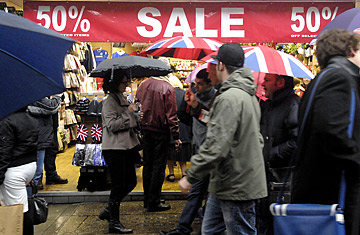
Shoppers on Oxford Street in London.
It's barely 7 a.m. but there's a man making an unholy racket just outside the half-timbered portico of venerable London department store Liberty's. "Oyez, oyez!" bellows Peter Moore, the capital's sole remaining town crier, vigorously swinging his hand bell. "This store is open for all your Christmas shopping needs!"
In gold-frogged red coat and ostrich-trimmed tricorn hat, Moore embodies the image of Dickensian London long promoted by the city's tourism chiefs to lure foreign visitors at Yuletide. It is now being deployed on this dank, dark morning to tempt customers across the threshold of Liberty's. It's no easy task. London is anticipating its most Dickensian Christmas for years — and there's not likely to be a Christmas Carol-style feel-good ending. (See pictures of Santas gone wild.)
Nope, it's the specter of a scary, skeletal, credit-crunched holiday season that has Brits collectively behaving like Scrooges, unmoved by the government's newly unveiled 20 billion pound fiscal stimulus package and a cut in value-added tax. And unless retailers persuade consumers that redemption — for individuals, for businesses and for the wider economy — lies in more generous spending, Britain's downturn threatens to be steep indeed. According to the British Retail Consortium, retail sales account for a fifth of the nation's economy, with the sector responsible for some 8% of GDP and employing 11% of Britain's total workforce.
As Brits close their wallets, all that wealth-creating, job-generating activity is dwindling. Fresh government figures reveal a drop in consumer spending of 0.2% this fall, the worst performance in 13 years, and experts predict profound misery in the final quarter, usually a boom-time for shops thanks to pre-Christmas gift splurges and post-Christmas bargain-hunting. Market research company Synovate forecasts a drop of 7.3% on shopping trips in December. Says Tim Denison, a retail psychologist and director of Synovate, which has used the same matrix to predict retail trends since 1995: "We haven't seen a figure like that leap out of our Christmas forecasts ever." (See Top 10 Black Friday Gifts.)
Anecdotal and empirical evidence seem to bear out Synovate's figures. Despite deep discounting and promotions that Denison describes as "hypercreative," sales have quite simply fallen off a cliff. Retailers are understandably coy about admitting to their own struggles, fearing that such revelations could endanger their credit lines and spook investors. A jeweler who prefers to remain anonymous says that top-end shops already weathered a drop-off in sales last Christmas and have been suffering throughout the year. "Bankers used to come in droves with their wives," says the jeweler. "There were lots of Americans and French too. We just don't see them any more." "I always thought I'd chosen the safe option in retailing, catering to a super-rich clientele," says a Bond Street retailer, who also declines to be quoted by name. "But even our super-rich clients are cutting back. They're buying ready-made instead of bespoke or delaying big purchases altogether."
Pain isn't the preserve of the posh. On Nov. 26 Woolworth's and MFI, main street perennials famed for their cheaply priced goods, both collapsed, putting 31,000 jobs at risk. Administrators are hoping to find a buyer for the 815 outlets in the Woolworth's chain, founded in 1909 as a British offshoot of the U.S. company. MFI found its niche selling budget furniture.
Both businesses had attracted criticism for their sluggish response to changing consumer tastes, but it didn't matter much in fat years — and British retailers have enjoyed some very fat years. In June, government figures showed that free-spending British families had racked up debts equivalent to 173% of their incomes, by far the highest ratio of debt to income among G7 nations. That's one reason why the IMF has predicted a sharper contraction in Britain than in other advanced economies.
A couple of bright lights shine among the sputtering fairy lights on British main streets. Young shoppers seem immune to the fears of their elders and are still flocking to stores such as Top Shop and H&M that offer high fashion at lowly prices. And the pound's weakness may yet boost tourism among foreign visitors hoping to snap up discounted goods at beneficial exchange rates. "The pound has declined 10% against the Euro and 28% against dollar compared to last year," says Elliott Frisby of the tourist authority Visit Britain. "There's never been a better time to holiday in this country."
Randi Aspeli is scouring London's newest and biggest mall, Westfield, for treats for her three children back in Norway. "There are things here which you cannot get in Oslo and they are cheaper," she says. In its first three weeks, Westfield attracted 2 million visitors with its mix of haute couture and mass-market outlets, but on this particular midweek afternoon business is visibly slow, with security guards in Prada's Miu Miu store outnumbering customers by two to one and sales assistants outnumbering security guards by the same margin. The neighboring Rigby & Peller shop, offering the classic lingerie styles reputed to find favor with the Queen alongside racier, French maid-themed numbers, is also deserted, but two perky salesgirls claim weekend trade is brisk. "Once people have tried our bras, they always come back," says one. "Everybody wants that uplift." It's a sentiment gloomy British retailers and their gloomier customers must surely endorse.
